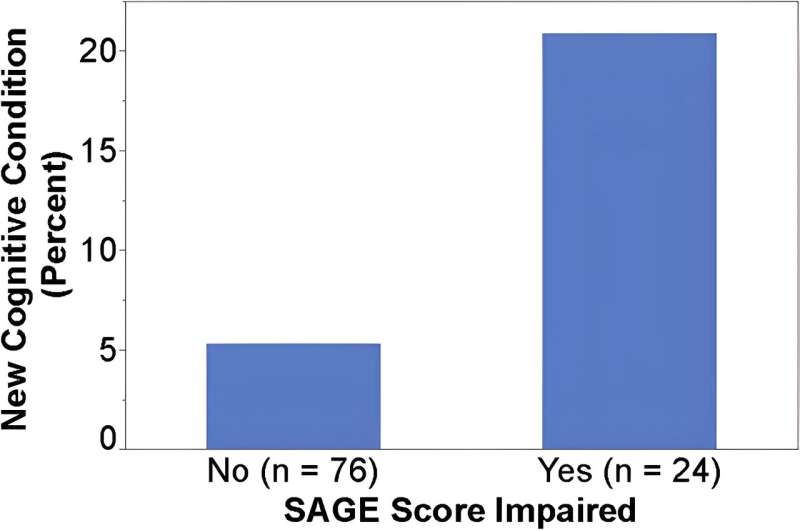This article has been reviewed according to Science X's editorial process and policies. Editors have highlighted the following attributes while ensuring the content's credibility:
fact-checked
trusted source
proofread
Self-administered test in primary care offices found to increase early diagnosis of cognitive disorders

Primary care providers often are the first to identify and evaluate patients with neurocognitive disorders such as mild cognitive impairment, Alzheimer's and dementia.
But diagnosing cognitive problems is often hard to do in primary care settings. Conducting robust accurate cognitive assessments can be time-consuming for providers and difficult to incorporate into a time-limited visit.
However, researchers at The Ohio State University Wexner Medical Center and College of Medicine have found that the practical and brief SAGE test was easily incorporated into primary care providers' visits.
The free Self-Administered Gerocognitive Exam (SAGE) developed by Ohio State researchers is designed to detect early signs of cognitive, memory or thinking impairments. It evaluates a person's thinking abilities and helps physicians to know how well their brain is working.
Study findings are published in the journal Frontiers in Medicine.
"Among those who were given the SAGE test, new cognitive disorders were diagnosed by the primary care provider in 9% of patients, whereas among people who did not take the SAGE test, these disorders were only identified in 1.5%.
"So there was a sixfold increase in detection of new cognitive disorders based on the use of this self-administered, practical-to-give cognitive assessment tool," said Douglas Scharre, MD, director of the division of cognitive neurology at Ohio State Wexner Medical Center and lead author of the study.
A total of 86% of the primary care providers who engaged in this study said they would recommend using SAGE to their colleagues.
The study was conducted with patients 65 and older in two primary care offices at Ohio State Wexner Medical Center.
"We took 100 consecutive patients that were never diagnosed with any cognitive disorder, coming in for just a routine visit. Then we took an additional 100 consecutive patients and gave them the SAGE test. And then we compared whether that increased the discovery or the identification of new cognitive disorders," said Scharre, who is a professor of clinical neurology and psychiatry in the department of neurology at Ohio.
The SAGE test appears to be identifying cognitive impairments in individuals at an earlier time point then when SAGE is not used. Catching patients in the early stages of impairment are when medications are the most effective.
"In our study we identified 9% of patients that I think we're catching at an early stage," Scharre said. "Therapies always work better the earlier you start them no matter what the cause of the cognitive impairment is."
The pen-and-paper SAGE test or its digital version BrainTest are brief and self-administered. They can be used by patients in their provider's office or at home. Trained individuals are not required to administer the test that assesses different parts of the brain.
"SAGE test is a multi-domain cognitive assessment tool that includes not just memory tests, but also tests for language, calculations, abstractions, visual spatial drawing, problem solving, and executive impairments that match deficits attributed to different parts of the brain," Scharre said.
"So we're trying to measure, 'Okay, that part of the brain is working well, that part's not working as well.' And that pattern will help us figure out what might be causing those deficits."
More information: Douglas W. Scharre et al, Self-administered gerocognitive examination (SAGE) aids early detection of cognitive impairment at primary care provider visits, Frontiers in Medicine (2024). DOI: 10.3389/fmed.2024.1353104




















